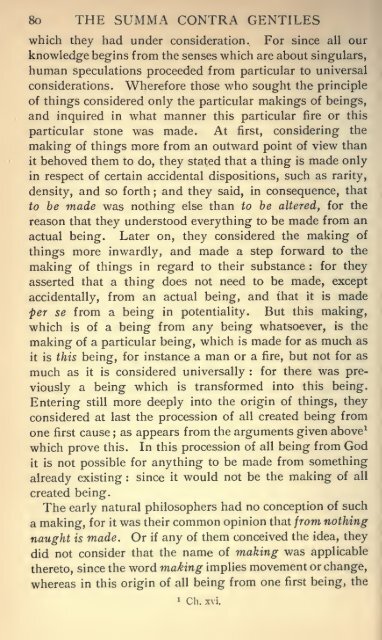summa-contra-gentiles
Summa
Summa
Create successful ePaper yourself
Turn your PDF publications into a flip-book with our unique Google optimized e-Paper software.
8o<br />
THE SUMMA CONTRA GENTILES<br />
which they had under consideration. For since all our<br />
knowledge begins from the senses which are about singulars,<br />
human speculations proceeded from particular to universal<br />
considerations. Wherefore those who sought the principle<br />
of things considered only the particular makings of beings,<br />
and inquired in what manner this particular fire or this<br />
particular stone was made. At first, considering the<br />
making of things more from an outward point of view than<br />
it behoved them to do, they stated that a thing<br />
is made only<br />
in respect of certain accidental dispositions, such as rarity,<br />
density, and so forth ;<br />
and they said, in consequence, that<br />
to be made was nothing else than to be altered, for the<br />
reason that they understood everything to be made from an<br />
actual being. Later on, they considered the making of<br />
things more inwardly, and made a step<br />
forward to the<br />
making of things in regard to their substance for they<br />
:<br />
asserted that a thing does not need to be made, except<br />
accidentally, from an actual being, and that it is made<br />
per se from a being in potentiality. But this making,<br />
which is of a being from any being whatsoever, is the<br />
which is made for as much as<br />
making of a particular being,<br />
it is this being, for instance a man or a fire, but not for as<br />
much as it is considered universally<br />
: for there was previously<br />
a being which is transformed into this being.<br />
Entering still more deeply into the origin of things, they<br />
considered at last the procession of all created being from<br />
one first cause ;<br />
as appears from the arguments given above^<br />
which prove this. In this procession of all being from God<br />
it is not possible for anything to be made from something<br />
already existing ; since it would not be the making of all<br />
created being.<br />
The early natural philosophers had no conception of such<br />
a making, for it was their common opinion that frovi nothing<br />
naught<br />
is made. Or if any of them conceived the idea, they<br />
did not consider that the name of making was applicable<br />
thereto, since the word making implies movement or change,<br />
whereas in this origin of all being from one first being, the<br />
1<br />
Ch. xvi.


















